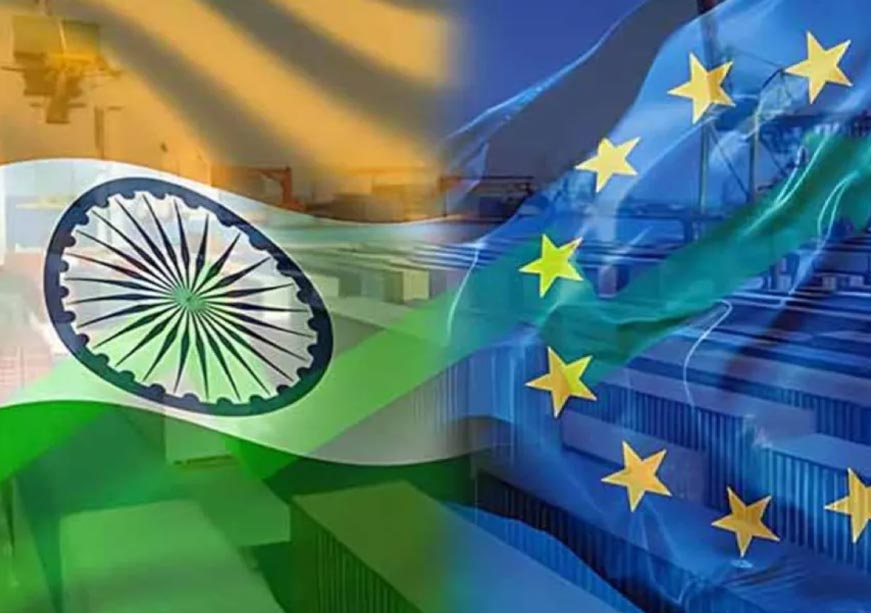-
CENTRES
Progammes & Centres
Location
The Trump–Modi trade clash has reopened a rare political window: can Brussels and New Delhi finally break the cycle of stalled EU–India talks?

On Monday, 4 August 2025, the United States (US) President Donald Trump announced a likely “substantial” increase in tariffs against India, accusing New Delhi of purchasing discounted Russian oil and reselling it on global markets for profit. “They don’t care how many people are being killed in Ukraine by the Russian war machine,” Trump wrote in a post, justifying his decision in overtly political terms. India’s response came just hours later, in an official statement denouncing Western “double standards” and noting that both the US and the European Union (EU) maintain economic ties with Moscow in non-vital sectors.
This exchange signals something deeper: the commercial dialogue between India and the US remains fragile, shaped by rhetorical divergences and non-trade dynamics. For the EU, which has long sought a breakthrough with New Delhi, a genuine political opportunity has re-emerged. The negotiations for a Free Trade Agreement (FTA) with India—suspended in 2014 and relaunched in 2022—are now driven by a rare mix of geopolitical urgency, strategic convergence, and economic pressure. India's statement notably references the EU for three key reasons. First, New Delhi views Brussels as exhibiting similar double standards to those it accuses Washington of. Second, mentioning the EU helps divert potential confrontation with the US. Finally, this message may signal Brussels regarding the need for a mutually respectful relationship grounded in national interests.. In this sense, the EU would be wise to avoid acting through pre-packaged and bureaucratic diplomatic schemes—particularly by resisting eventual US pressure to impose sanctions on India. Doing so would risk undermining its own credibility: sanctions driven by Washington’s transactional logic may later be lifted in exchange for strategic concessions, whereas the EU should adopt a broader, more autonomous view of its strategic interest in securing a trade deal with India. Through such a deal, Brussels could also open the door to negotiating concrete forms of Indian de-risking and gradual decoupling from Russia.
The EU would be wise to avoid acting through pre-packaged and bureaucratic diplomatic schemes—particularly by resisting eventual US pressure to impose sanctions on India.
In 2014, negotiations collapsed after seven years due to a lack of political will and India’s focus on shielding its manufacturing sector. The strategic partnership was labelled “rich in rhetoric but poor in substance”. The turning point came at the Porto Summit in May 2021, when both sides agreed to relaunch talks. In 2022, a bilateral Trade and Technology Council—previously reserved only for the US—was established. And in February 2025, a high-level meeting between Ursula von der Leyen and Narendra Modi reaffirmed the shared goal of agreeing “by the end of the year”.
The ambition is warranted. India is the world’s fastest-growing major economy. An FTA with the EU would be its first with a significantly larger economic partner. For Brussels, it would consolidate ties with a strategic partner in Asia, helping it recover market share lost to countries such as South Korea and Japan, which already benefit from preferential trade deals with India. Removing tariffs on capital goods and intermediate products would support the development of India’s export-oriented manufacturing base, while aiding the EU in regaining its competitiveness in key sectors, such as automotive. Progress on the India–Middle East–Europe Economic Corridor (IMEC) could further iron out the creases.
Yet the agreement goes beyond trade. Both India and the EU seek greater strategic autonomy, value chain diversification, and systemic stability. In a fragmented world, the FTA would represent a contribution to building a rules-based multipolar order through partnerships among democracies – even if with diverse norms and systems. The two sides could coordinate on World Trade Organization (WTO) reform, environmental standards, economic governance, and some geopolitical alignment, offering an alternative to Chinese unilateralism and American unpredictability.
Challenges, however, abound. The deal must overcome the same structural hurdles that previously derailed talks. India’s average tariffs stand at 17 percent, which is among the highest in the Indo-Pacific. The automotive sector remains especially contentious: EU carmakers demand better access, while India—supported by Korean and Japanese investors—opposes further liberalisation. Rules of origin remain a sticking point, and India’s quality control orders (QCOs) significantly impede the commercialisation of European products.
In a fragmented world, the FTA would represent a contribution to building a rules-based multipolar order through partnerships among democracies – even if with diverse norms and systems.
Furthermore, the regulatory environment poses another hindrance. The cost of doing business in India often exceeds the tariff burdens. The services sector remains largely closed, and India has so far avoided commitments on digital trade, data localisation, or banning duties on e-commerce. On environmental policy, New Delhi objects to the EU’s Carbon Border Adjustment Mechanism (CBAM) and has requested an exemption—something Brussels cannot grant without undermining WTO rules and Green Deal objectives. Divergences over deforestation-related regulations are equally significant.
Investment poses further complications. India has terminated its bilateral investment treaties with several EU member states, deterring foreign direct investment. A new investment agreement is under discussion, but investor–state dispute settlement (ISDS) provisions would require unanimity among EU members. To date, the EU has no investment treaty in force with India, including provisions for ISDS. Public procurement is also contentious: Indian law prioritises domestic products, and in the absence of non-discrimination clauses, the EU may reserve the right to impose reciprocal restrictions.”
Then, there is the sustainable development chapter (TSD). The EU demands binding commitments and an enforcement mechanism with potential sanctions—conditions seen as red lines by New Delhi. Provisions requiring civil society participation are also contentious and may require more flexible terms than in other EU agreements.
Nonetheless, the political window remains wide open—especially in light of the Trump–India clash. Concluding a partial agreement by the end of 2025 seems less a possibility than a necessity. An ‘early harvest’ deal could narrow the gap and create space for resolving outstanding disputes. If structured wisely, the agreement could attract EU investment into Indian manufacturing and bolster green industries through Clean Trade and Investment Partnership (CTIP) partnerships. More broadly, it would cement an EU–India axis capable of shaping global governance—particularly in the Indo-Mediterranean, encompassing the Red Sea and Gulf regions that underpin vital Europe–Asia trade flows.
A new investment agreement is under discussion, but investor–state dispute settlement (ISDS) provisions would require unanimity among EU members.
Success is far from assured. But rarely have the political, economic, and strategic conditions aligned so clearly—especially given the need for both sides to respond to the coercive posture of Donald Trump. The alternative is all too familiar: a cycle of lofty promises and intermittent substance—a missed opportunity for both partners.
Emanuele Rossi is an international affairs analyst with a focus on the global connections of the Enlarged Mediterranean. He is a senior analyst at Decode39, Formiche, and the Med-Or Italian Foundation, and collaborates with various international think tanks and media outlets.
The views expressed above belong to the author(s). ORF research and analyses now available on Telegram! Click here to access our curated content — blogs, longforms and interviews.

Emanuele Rossi is an international affairs analyst with a focus on the global connections of the Enlarged Mediterranean. He is a senior analyst at Decode39, ...
Read More +